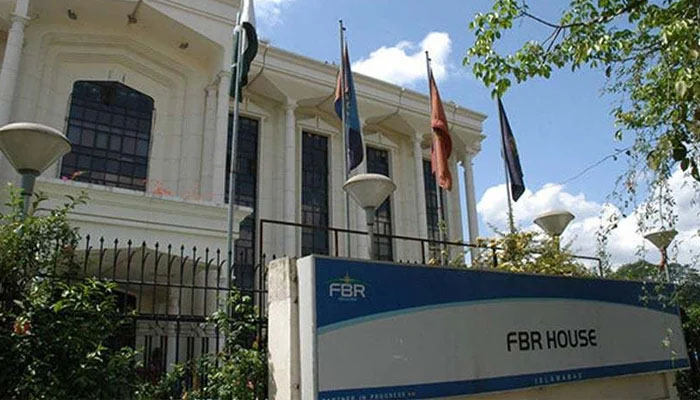FBR gets data of 3,500 potential tax dodgers
Minister of State for Finance Aisha Ghaus Pasha chaired a meeting at the FBR headquarters
ISLAMABAD: The National Database Registration Authority (Nadra) has shared 3,500 tax profiles of potential tax dodgers with the FBR to find out possibilities for expanding the tax base.
Minister of State for Finance Aisha Ghaus Pasha chaired a meeting at the FBR headquarters on Wednesday during which Chairman Nadra along with his team shared a profile of around 3,500 potential tax dodgers.
“Now, the FBR will scrutinise these tax profiles to find out dodgers who could be brought into the narrow tax base,” top official sources confirmed while talking to The News.
The FBR team informed the meeting the existing tax gap stood at Rs3,000 billion because of policy issues and tax evasions. There was a tax gap of Rs3,000 billion out of which Rs1,800 billion was a policy gap, as it occurred mainly because of tax exemptions/incentives provided by the FBR to different sectors. There is a remaining compliance gap of Rs1,200 billion.
When contacted, Minister of State for Finance and Revenues said there was need to make realistic targets as the FBR’s tax-to-GDP ratio was close to nine percent and it could be jacked up to 1.5 to 2 percent through improved policy interventions and effective enforcement. She said Nadra shared its profile data and the FBR was tasked to come up with its analysis that how much it could be utilised to expand the narrow tax base.
She said THE country’s overall tax-to-GDP ratio could be improved up to 13 to 14 percent provided THE provinces also geared up to maximize revenue collection, as three major sectors – real estate, services and agriculture income – fall into the jurisdiction of the provinces.
To another query, she said there was no need to envisage ambitious target as it resulted in creating despondency. “We will consider it as success if we increase 100,000 potential taxpayers with the help of Nadra”, she added.
Under the Finance Act 2022, the FBR and Nadra have empowered the exchange of information for expanding the tax base. It is relevant to mention here that such efforts were made in the past also but all these failed to materialise. There is one difference. The exchange of data will be the result of a law approved by the Parliament.
Tax officials who had worked along with Nadra in the past told this scribe there could be a variety of reasons for an individual case for ascertaining anyone’s lifestyle on the basis of which his or her tax liability could be determined.
For instance, someone might have income from agriculture or sends money from abroad through remittances. However, they agreed the Nadra’s profiles could be utilised as one of the sources for expanding the narrow tax base.
Though there is no scarcity of information, the FBR is facing challenges. The problem is how to convert the information into taxability under the existing law of the land. It is true people are earning lofty incomes, but they never bother to come into the tax net.
-
 James Van Der Beek's Quiet Sacrifice Before Death Comes To Light
James Van Der Beek's Quiet Sacrifice Before Death Comes To Light -
 Suspect Kills Six Across Florida Before Taking His Own Life
Suspect Kills Six Across Florida Before Taking His Own Life -
 AI Helps Researchers Identify 2,000-year-old Roman Board Game Stone
AI Helps Researchers Identify 2,000-year-old Roman Board Game Stone -
 Inside Kate Middleton, Prince William’s Nightmare Facing Andrew Mountbatten-Windsor
Inside Kate Middleton, Prince William’s Nightmare Facing Andrew Mountbatten-Windsor -
 Margaret Qualley Shares Heartfelt Confession About Husband Jack Antonoff: 'My Person'
Margaret Qualley Shares Heartfelt Confession About Husband Jack Antonoff: 'My Person' -
 Savannah Guthrie Shares Sweet Childhood Video With Missing Mom Nancy: Watch
Savannah Guthrie Shares Sweet Childhood Video With Missing Mom Nancy: Watch -
 Over $1.5 Million Raised To Support Van Der Beek's Family
Over $1.5 Million Raised To Support Van Der Beek's Family -
 Paul Anthony Kelly Opens Up On 'nervousness' Of Playing JFK Jr.
Paul Anthony Kelly Opens Up On 'nervousness' Of Playing JFK Jr. -
 Diana Once Used Salad Dressing As A Weapon Against Charles: Inside Their Fight From A Staffers Eyes
Diana Once Used Salad Dressing As A Weapon Against Charles: Inside Their Fight From A Staffers Eyes -
 Video Of Brad Pitt, Tom Cruise 'fighting' Over Epstein Shocks Hollywood Fans
Video Of Brad Pitt, Tom Cruise 'fighting' Over Epstein Shocks Hollywood Fans -
 Jelly Roll's Wife Bunnie Xo Talks About His Huge Weight Loss
Jelly Roll's Wife Bunnie Xo Talks About His Huge Weight Loss -
 Margot Robbie Reveals Why She Clicked So Fast With Jacob Elordi
Margot Robbie Reveals Why She Clicked So Fast With Jacob Elordi -
 Piers Morgan Praised By Ukrainian President Over 'principled Stance' On Winter Olympics Controversy
Piers Morgan Praised By Ukrainian President Over 'principled Stance' On Winter Olympics Controversy -
 Halsey's Fiance Avan Jogia Shares Rare Update On Wedding Planning
Halsey's Fiance Avan Jogia Shares Rare Update On Wedding Planning -
 Instagram Head Adam Mosseri Says Users Cannot Be Clinically Addicted To App
Instagram Head Adam Mosseri Says Users Cannot Be Clinically Addicted To App -
 James Van Der Beek Was Working On THIS Secret Project Before Death
James Van Der Beek Was Working On THIS Secret Project Before Death




